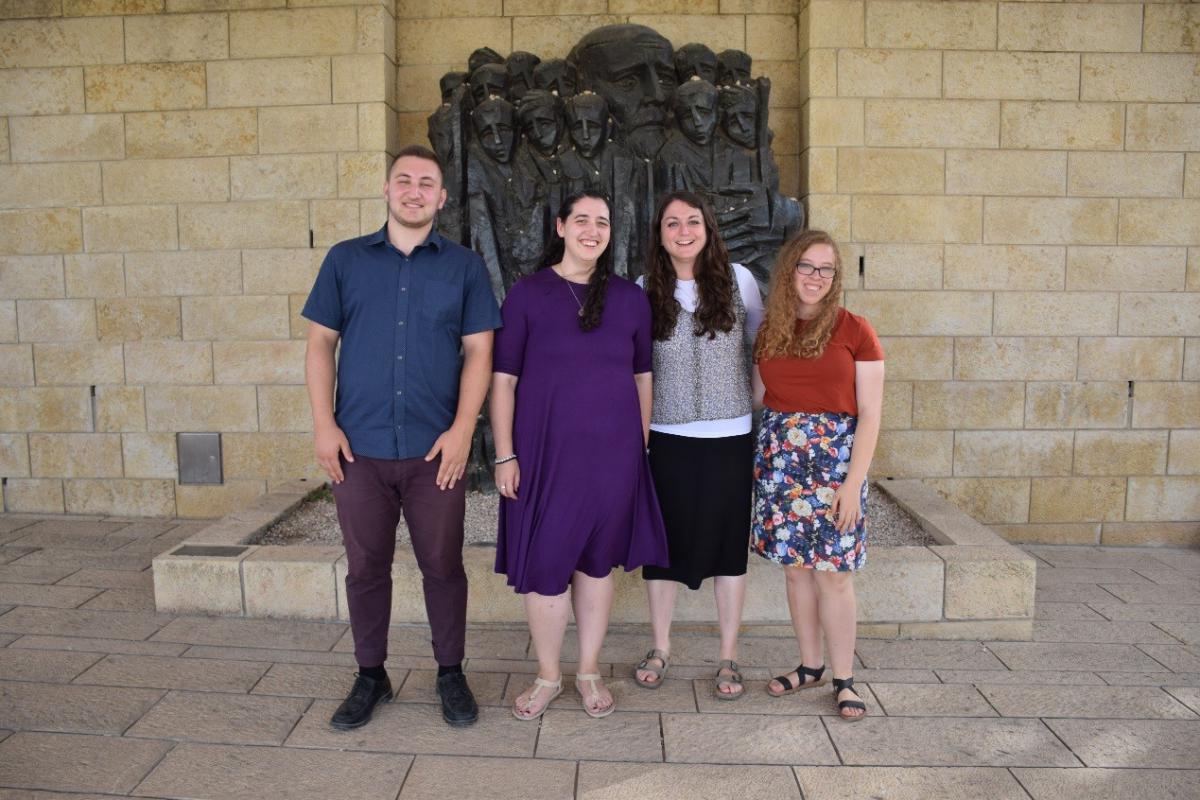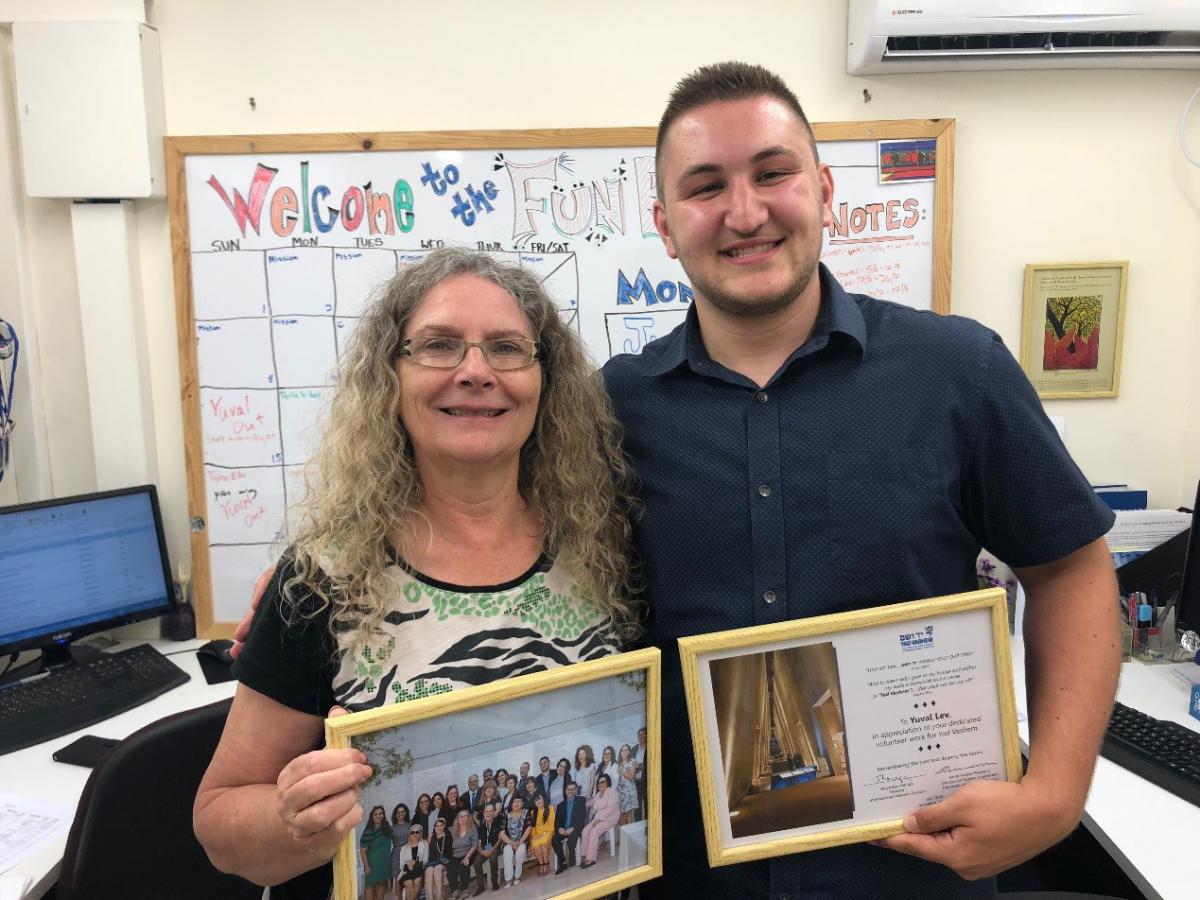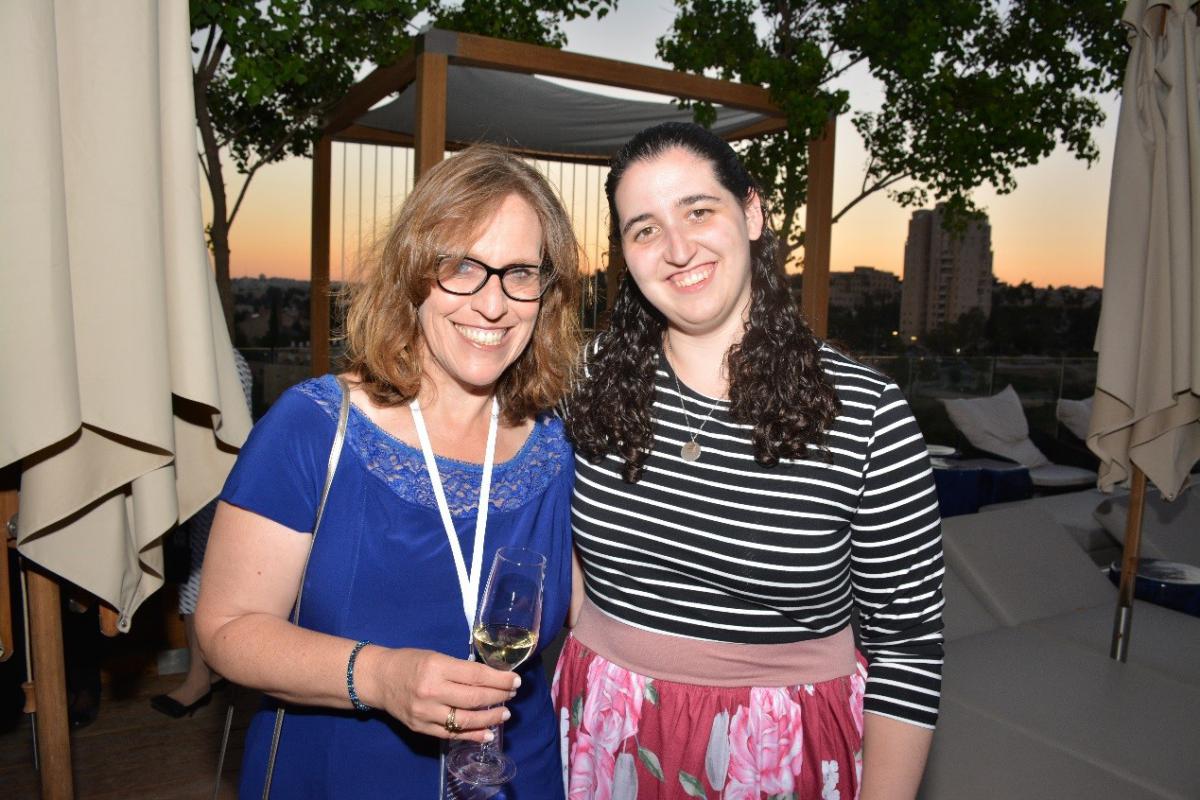





Over the summer, Yad Vashem's International Relations Division welcomed a number of young interns eager to help out during a busy time. During the course of their stay, they had an opportunity both to contribute meaningfully to Holocaust education and commemoration, and to learn more about the World Holocaust Remembrance Center's varied and vital work.
This group of interns, just like Yad Vashem's staff as a whole, hailed from interesting and diverse backgrounds. Layla Blenden is the marketing coordinator of a group of New Jersey-based Jewish summer camps; Yuval Lev is an Israeli-American political communications student at George Washington University; Lauren Kirschenbaum is a social worker who recently made Aliyah; and Zehavit Schwartz is an American-Israeli performing her national service year at Yad Vashem. They spoke about their time working for Yad Vashem's International Relations Division, their surprising discoveries, and their future plans in light of this unique opportunity.
Why did you choose to volunteer at Yad Vashem?
Layla Blenden: As the granddaughter of a hidden child and the great-granddaughter of people who were saved by a Righteous Among the Nations [non-Jews who risked their lives to saves Jews during the Holocaust], I have always felt a strong connection to Yad Vashem. My grandmother always reiterated how important Yad Vashem is to the Jewish people; it was she who took me through Yad Vashem's Holocaust History Museum for the first time and explained to me firsthand its significance for humanity as a whole.
Four years ago, I participated in the first Yad Vashem International Mission, and have been involved with Yad Vashem, specifically the American Society for Yad Vashem's Young Leadership Associates, since then. After joining the second International Mission in 2016, this past summer I also participated in Yad Vashem's 2018 "Generation to Generation" Mission to Austria and Israel. I wanted to do something meaningful with my time in Israel after the Mission, so I sought out volunteer opportunities within Yad Vashem as a way of giving back.
Lauren Kirschenbaum: My grandparents were Holocaust survivors. My grandmother passed away a few months ago, and I was looking to do something to honor her memory. She was very vocal about her experiences in the Holocaust, and I always thought it was very important to educate the future generations about the atrocities that occurred. Yad Vashem seemed like the perfect place for me to honor my grandmother and continue her calling to help educate the world about the Holocaust.
Yuval Lev: Once I knew I was coming to Israel on an internship program, Yad Vashem was my first choice for so many reasons. My family was personally affected by the Holocaust and have always emphasized the importance of knowing one's history. We have been to Poland and visited Holocaust museums around the world, but Yad Vashem was particularly impactful for me, and I knew I wanted to come back to learn more. Working here has been the ultimate opportunity to learn and contribute to something so meaningful.
Zehavit Schwartz: I wanted to choose something important for my national service year – something in which I would feel I was truly contributing. I have always had a strong connection to the Holocaust through my family's history, and Yad Vashem felt like the right way to honor both the memory of the Holocaust and to do something with consequence.
What did you work on while interning at Yad Vashem?
LK: I was involved in several projects, but what I enjoyed the most was accompanying groups on tours and photographing their visits. I found it moving to observe other people experiencing the Holocaust History Museum and to witness their reactions to what they were learning .
ZS: I did various jobs around the office, including working on the Twinning Projects, in which I matched a Bar/Bat Mitzvah child with a Jewish child who was murdered and never had the opportunity to celebrate their own coming of age. This was especially moving for me.
YL: During my time at Yad Vashem, the 2018 International Mission occurred and we hosted nearly 100 friends of Yad Vashem, including four Holocaust survivors. I served as part of the Social Media Team for the mission, writing tweets, Facebook posts and captions for videos.
LB: Since I started working right after participating in the 2018 Mission, I was asked to look through the mission's photographs and organize them into personalized folders for each participant. In addition, I took photographs of museum visits, and helped out in various other projects, including the translation of texts from Hebrew to English.
Did anything surprise you about the work at Yad Vashem?
LB: It is interesting to see how different people can see the same information and the same exhibits from different perspectives. Yad Vashem's expert guides always manage to teach something new and give nuance to the history that speaks to the groups they are guiding.
YL: What surprised me most about working at Yad Vashem was the variety of people working here and how that impacted my experience. I thought I would be speaking Hebrew at work and working with only native-born Israelis, but I got a chance to work with individuals from all over the world who all had a story to tell. Working here during the World Cup made the international nature of the workplace that much more interesting!
The other thing that amazed me most was the contemporary nature of the Holocaust and how it remains relevant today. For instance, current events, such as the visit of Prince William, the Mission, and research and education seminars were some of the key highlights during my time at Yad Vashem.
What did you gain from your experience?
YL: I gained a new appreciation of the current dilemmas facing Yad Vashem and Holocaust remembrance. Today, as survivors grow older and illiberalism is rising worldwide, it is more important than ever to speak with moral clarity and urgency and work in solidarity with all persecuted people. I am determined to do that in my everyday interactions going forward.
LK: My experience at Yad Vashem strengthened my passion to pass on my knowledge about the Holocaust to others. It reminded me of the importance of not forgetting the past while moving on towards a better future.
Yad Vashem is known as the World Holocaust Remembrance Center. Why do you think the institution attracts so many educators and visitors each year?
YL: Yad Vashem changes the way you think about the Holocaust because it helps you understand the nuances and context behind the history. It's easy, in a classroom or a short conversation online, to only focus on one generalized aspect of the story, such as the six million victims who were murdered, but Yad Vashem does a great job of giving visitors a multifaceted understanding of the Holocaust in all its complexities – and its relevance to people from all over the world even today.
Why do you think Holocaust education and remembrance is still relevant today, over seven decades after the end of WWII?
ZS: Holocaust education and remembrance are still relevant today for many reasons, including combating antisemitism, discrimination and the abuse of human rights. By continuing Yad Vashem's undertaking, we are ensuring that the world remembers what they did to the Jews, so that, as part of the human race, we can learn from it. We must teach the next generation because they will not have living survivors as testament. It is our duty to combat those that deny our tragedy.
LB: Participants in this year's "Generation to Generation" Mission included four Holocaust survivors, second-generation children of survivors, and third-generation grandchildren. We were lucky enough to hear firsthand testimony of each of the survivors throughout the mission, as well as family stories from a number of other participants. One recurring conversation during the Mission was the importance of continuing the dialogue and keeping the memory of the Shoah alive. As the generation of survivors dwindles, it is up to the second, third and even fourth generations to relay the stories they were told and perpetuate Yad Vashem's core duties.
LK: There are unfortunately still many Holocaust deniers out there, and as the number of Holocaust survivors is dwindling, I think it is now more important than ever that Holocaust education and remembrance still exists and continues to grow and develop. It is our job to ensure that the memories of those who were murdered and those who survived be forever honored and preserved, and that the world never forgets the atrocities that took place.
How will you maintain your connection with Yad Vashem and Holocaust education in the future?
LB: I plan to continue my involvement with the American Society's Young Leadership Association. Additionally, on any future trips to Israel, I plan on visiting Yad Vashem (and the amazing staff I have met while interning here!), and encouraging others to visit and learn as much as they can from Yad Vashem.
YL: I hope to keep my connection with Yad Vashem alive by visiting here with my family and taking them through the Museum. Hopefully, I can contribute to Yad Vashem in the future by encouraging others to volunteer here and have a meaningful experience like I did. Perhaps I could attend one of the Missions one day.
Most importantly, I want to be someone that actively fights historical revisionism and Holocaust denial. I want to serve as a resource to others who want to learn more or have been misinformed. When something like [the far-right racist demonstrations and loss of life in] Charlottesville happens, it is clear to me that we are not done fighting the ideas of Nazism in this world. We must remain vigilant.









